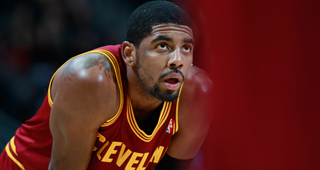Kyrie Irving has requested a trade away from LeBron James and the Cleveland Cavaliers. Suddenly becoming a highly specialized player as a 22-year-old—whose main purpose every season is to take it relatively easy until he’s asked to score 40+ points in a few NBA Finals games—was apparently not what Irving had in mind for the legacy of his career. Now 25, Irving is ostensibly ready to walk away from automatic championship contests every June for the more self-as-business glory of earnestly bowing out, but doing more on the court and for longer, every April or May.
Such an approach to the calendar beckons one of the major cultural curiosities attached to Kyrie: that he believes that the planet earth, the one we live on and that rotates in both its own axis and in one around the sun, is flat. Irving, who could turn out to be an even better scoring point guard than rival Steph Curry by the time he turns 30, lives in a different world than the rest of us, and it’s one where he seems unconcerned with metrics that the greater population values or even ones that make physical sense.
The way Kyrie plays, of course, does not make physical sense. With a bespoke sense of time and space, Irving defies coverage and physics to score at will in high-gravity games. In moments like his 38-point showcase in Game 3 of the Cavs’ losing Finals effort against the Golden State Warriors, Irving scored on four Warriors at once, stepped into impossible spaces, and exerted a will power that makes a strong case for his desire to fly free from the shadow of the league’s greatest player. An astounding storm of jukes, spins, and disarming touches and vision, Kyrie as captain of his own ship is a prospect that looms large in the future outlook of the league.
Not coincidental to Irving’s desire to detach from his monopolistic Eastern Conference mothership and start his own crusade is the way that he feels about Kobe Bryant. Kyrie has recently paid deference to “Mamba Mentality,” the quasi-religious set of truisms and mildly reworked cliches (“constant quest”; “not a finite thing”) that the famous Laker puts forward as part of his tyrannical branding empire. The cryptic aspiration of Bryant’s ethos reflects both the cult of personality and the swath of controversial, conspiracy-laden grudges that have always accompanied his career.
Irving finds himself rising while dealing with a similar bog of issues, and he appears to be embracing the singular spot that his sometimes-mentor once knew: pushing up against the legacy of an incumbent great with the growing clout of his own talent and celebrity. Irving, like Bryant before him, appears poised to break up a superpower in order to be his own. Gravity and championships and realities of topography do not touch the version of self that these men know—and it is a version, to be sure, that millions and millions have adopted as ideology, regardless of whether they can ever be like these men.
Such is the nature of what Kyrie ultimately wants to make from this game: a philosophy. Like arguably all the worldviews before his, it does not stand to reason so much as it justifies itself through pure visceral thrust. Said thrust has reportedly begun to destabilize the scientific logic of a host of middle schools, with students prescribing to Irving’s understanding of the world’s shape. “They think that I’m part of this larger conspiracy of being a round-Earther,” middle school teacher Nick Gurol opined to the Washington Post. “That’s definitely hard for me because it feels like science isn’t real to them.”
Rare is the platform so high and reliably attended to that the men who stand on it can speak counterfactual gibberish and watch it change minds, sending fact-holding people into a tizzy with corrections announced to deaf ears. Kyrie Irving’s skill and style–and his strange relationship with fate that landed him as a primary character in LeBron’s Odyssean adventure–have combined to turn him into one of these idols. His audience is paying and willing and growing, docile to his music. Now he wants to take them elsewhere, to an arena where he can more maximally be what he is.
The fraught mass of concerns between Irving’s desired trade away from Cleveland and the Cavs he stands with now has included a challenge to the righteousness of LeBron, a nearly unimpeachable hero who rebranded himself from pariah status by coming back home. Kyrie has perhaps mocked the essence of that transformation in a recent social media post, singing the chorus to Diddy’s “Coming Home,” also the title of LeBron’s famous 2014 announcement, in what might be a sarcastic tone—this amidst rumors of rising tension between him and James. It takes a very brassy man, unfazed by firm things that dictate movement for the rest of us, to sing in such a way. The NBA will be different if Kyrie takes his song elsewhere.



